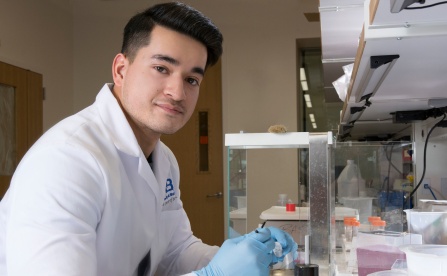Undergraduate Research Opportunities

Ajay Baindur appreciates the many research areas he can explore in pharmacology and toxicology as an undergraduate student.
Conducting lab research as an undergraduate lays the groundwork for a successful career in pharmacology and toxicology, neuroscience and related fields in the biomedical sciences.
Our majors get hands-on research experience in PMY 409 (Experimental Pharmacology), a requirement for the BS. We also offer lab research experience to majors and interested non-majors with appropriate backgrounds via PMY 498 (Undergraduate Research Participation in Pharmacology and Toxicology).
You'll also have an opportunity to earn research honors.
Many of our faculty work with students from universitywide programs, including:
Jump-Start Your Research Career
As a student researcher, you will work in our labs at the cutting edge of pharmacology and toxicology research to gain insight and expertise on every part of the research process. You will take on a focused project and, under a mentor’s guidance, build on the skills and concepts from your coursework to generate independent, high-quality data.
We encourage you to make significant intellectual contributions to your labs. Many of you will stay with a lab two to three years, carrying out longer-term projects and getting your names on publications in prominent journals. This makes your CV very competitive for applications to graduate school, MD and PharmD programs and other pursuits.
Present Your Research
Very often, students produce posters based on their research for presentation at UB and beyond. This includes the Celebration of Academic Excellence, where our students not only consistently present, but also win prestigious awards.
You are strongly encouraged to present your research at the annual meetings of the American Society for Pharmacology and Experimental Therapeutics or Society of Toxicology, among others.
Gain Practical Lab Experience
Participating in lab meetings gives you insight into life in a research lab and connects you to fellow researchers, from other undergraduates through senior faculty members. In your lab you can gain a wide range of skills in techniques and data analysis, including:
- high-performance liquid chromatography
- mass spectrometry
- nuclear magnetic resonance
- microscopy
- protein analysis
- receptor binding
- behavioral analysis
- statistical analysis
- research ethics
Research Honors
You can earn research honors if you:
- complete a minimum of 12 hours of approved PMY 498 credits (with 9 credits in the same lab)
- and present your research at a department-approved research presentation.
Your research honors will be recorded on your transcript.
Applying and Registering
Although we have no formal prerequisites, our research opportunities are selective. Faculty prefer students with some knowledge in fields such as medicinal chemistry, organic chemistry and statistics, but previous lab experience is not necessary. Course credit requires you to work three hours per week in the lab for every hour of credit you earn — so a three-hour class means making a commitment of nine hours per week.
These are the steps you need to follow to get credit for undergraduate research:
- Familiarize yourself with our faculty's research through one of these suggested links and select the lab that interests you most.
- Email or call the faculty member directly to request a meeting, providing your latest CV and a description of your interest in research. Specify any topics you especially want to pursue.
- If the faculty member accepts you into his/her lab, contact Shannon Brown, who will arrange for you to receive credit through PMY 498. Non-majors may earn course credit via independent study in our department or their home department, or make other arrangements.
Questions?

Shannon M. Brown
Neuroscience Coordinator/Jacobs School Curriculum & Assessment
Jacobs School of Medicine and Biomedical Sciences, 955 Main Street, Suite 3102L, Buffalo, NY 14203
Phone: 716-829-5451
Email: smbrown3@buffalo.edu
Search for Faculty
Our searchable faculty profiles describe faculty research interests and ongoing projects:
Find a Research Opportunity
You may find a research mentor through several avenues:
SURF
The ASPET Summer Undergraduate Research Fellow (SURF) Award introduces undergraduate students to mentored research experiences in pharmacology to heighten interest in careers in research and health care disciplines.
CLIMB UP
This 10-week program gives you a chance to perform mentored research in the biomedical and STEM disciplines and explore graduate careers.
Welcome Day
Every fall semester, our faculty brief majors about the undergraduate curriculum and research opportunities for the coming academic year.
This student-run group hosts faculty presentations throughout the year.
Research Opportunity Listings
Faculty who are actively seeking student researchers list their projects in the Experiental Learning Network. The Experiential Learning Network also maintains a listing of summer and national research opportunities.
Collegiate Science and Technology Entry Program (CSTEP)
Students participating in CSTEP can find lab mentors in the biomedical sciences.
Ask Your Professors
Talk to faculty whose science classes you have taken. They may be able to suggest other faculty with whom you might work.
Student Clubs
Student organizations host speakers, facilitate shadowing opportunities and connect you with peers who share your interests—all of which may help you find a project mentor.